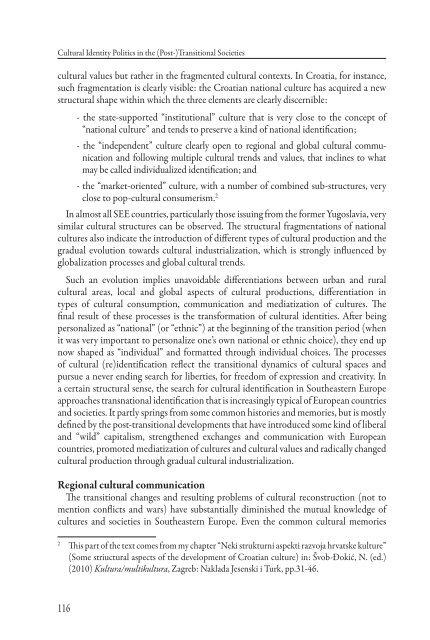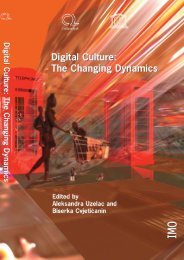free download in pdf format - Culturelink Network
free download in pdf format - Culturelink Network
free download in pdf format - Culturelink Network
Create successful ePaper yourself
Turn your PDF publications into a flip-book with our unique Google optimized e-Paper software.
Cultural Identity Politics <strong>in</strong> the (Post-)Transitional Societies<br />
cultural values but rather <strong>in</strong> the fragmented cultural contexts. In Croatia, for <strong>in</strong>stance,<br />
such fragmentation is clearly visible: the Croatian national culture has acquired a new<br />
structural shape with<strong>in</strong> which the three elements are clearly discernible:<br />
- the state-supported “<strong>in</strong>stitutional” culture that is very close to the concept of<br />
“national culture” and tends to preserve a k<strong>in</strong>d of national identifi cation;<br />
- the “<strong>in</strong>dependent” culture clearly open to regional and global cultural communication<br />
and follow<strong>in</strong>g multiple cultural trends and values, that <strong>in</strong>cl<strong>in</strong>es to what<br />
may be called <strong>in</strong>dividualized identifi cation; and<br />
- the “market-oriented” culture, with a number of comb<strong>in</strong>ed sub-structures, very<br />
close to pop-cultural consumerism. 2<br />
In almost all SEE countries, particularly those issu<strong>in</strong>g from the former Yugoslavia, very<br />
similar cultural structures can be observed. Th e structural fragmentations of national<br />
cultures also <strong>in</strong>dicate the <strong>in</strong>troduction of diff erent types of cultural production and the<br />
gradual evolution towards cultural <strong>in</strong>dustrialization, which is strongly <strong>in</strong>fl uenced by<br />
globalization processes and global cultural trends.<br />
Such an evolution implies unavoidable diff erentiations between urban and rural<br />
cultural areas, local and global aspects of cultural productions, diff erentiation <strong>in</strong><br />
types of cultural consumption, communication and mediatization of cultures. Th e<br />
fi nal result of these processes is the trans<strong>format</strong>ion of cultural identities. Aft er be<strong>in</strong>g<br />
personalized as “national” (or “ethnic”) at the beg<strong>in</strong>n<strong>in</strong>g of the transition period (when<br />
it was very important to personalize one’s own national or ethnic choice), they end up<br />
now shaped as “<strong>in</strong>dividual” and <strong>format</strong>ted through <strong>in</strong>dividual choices. Th e processes<br />
of cultural (re)identifi cation refl ect the transitional dynamics of cultural spaces and<br />
pursue a never end<strong>in</strong>g search for liberties, for <strong>free</strong>dom of expression and creativity. In<br />
a certa<strong>in</strong> structural sense, the search for cultural identifi cation <strong>in</strong> Southeastern Europe<br />
approaches transnational identifi cation that is <strong>in</strong>creas<strong>in</strong>gly typical of European countries<br />
and societies. It partly spr<strong>in</strong>gs from some common histories and memories, but is mostly<br />
defi ned by the post-transitional developments that have <strong>in</strong>troduced some k<strong>in</strong>d of liberal<br />
and “wild” capitalism, strengthened exchanges and communication with European<br />
countries, promoted mediatization of cultures and cultural values and radically changed<br />
cultural production through gradual cultural <strong>in</strong>dustrialization.<br />
Regional cultural communication<br />
Th e transitional changes and result<strong>in</strong>g problems of cultural reconstruction (not to<br />
mention confl icts and wars) have substantially dim<strong>in</strong>ished the mutual knowledge of<br />
cultures and societies <strong>in</strong> Southeastern Europe. Even the common cultural memories<br />
2 Th is part of the text comes from my chapter “Neki strukturni aspekti razvoja hrvatske kulture”<br />
(Some striuctural aspects of the development of Croatian culture) <strong>in</strong>: Švob-Đokić, N. (ed.)<br />
(2010) Kultura/multikultura, Zagreb: Naklada Jesenski i Turk, pp.31-46.<br />
116



